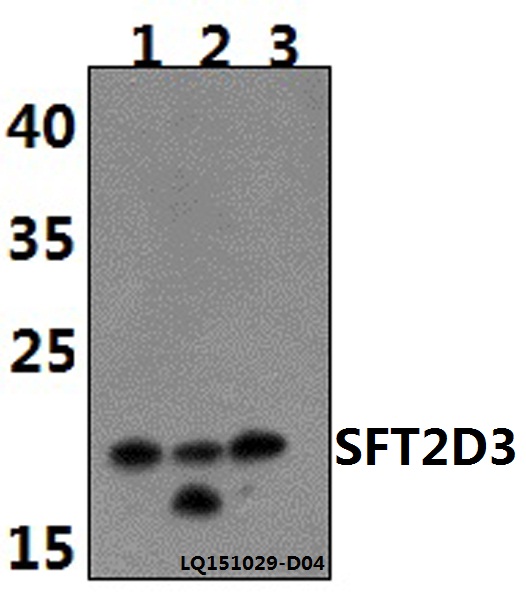Product Name :
SFT2D3 polyclonal antibody Background :
SFT2D3 (SFT2 domain-containing protein 3) is a 215 amino acid multi-pass membrane protein that belongs to the SFT2 family. SFT2D3 may be involved in fusion of retrograde transport vesicles derived from an endocytic compartment with the Golgi complex. The SFT2D3 gene is conserved in chimpanzee, cow, mouse, rat, zebrafish, fruit fly, mosquito and C.elegans, and maps to human chromosome 2q14.3. As the second largest human chromosome, chromosome 2 makes up approximately 8% of the human genome and contains 237 million bases encoding over 1,400 genes. A number of genetic diseases are linked to genes on chromosome 2. Harlequin icthyosis, a rare skin deformity, is associated with mutations in the ABCA12 gene. The lipid metabolic disorder sitosterolemia is associated with ABCG5 and ABCG8. An extremely rare recessive genetic disorder, Alström syndrome, is related to mutations in the ALMS1 gene. Chromosome 2 contains a probable vestigial second centromere as well as vestigial telomeres, which gives credence to the hypothesis that human chromosome 2 formed as a result of an ancient fusion of two ancestral chromosomes, which are still present in modern day apes. Product :
Rabbit IgG, 1mg/ml in PBS with 0.02% sodium azide, 50% glycerol, pH7.2 Storage&Stability :
Store at 4°C short term. Aliquot and store at -20°C long term. Avoid freeze-thaw cycles. Specificity :
SFT2D3 polyclonal antibody detects endogenous levels of SFT2D3 protein. Immunogen :
Synthetic peptide, corresponding to amino acids 101-146 of Human SFT2D3. Conjugate :
Unconjugated Modification :
Unmodification
SFT2D3 polyclonal antibody Background :
SFT2D3 (SFT2 domain-containing protein 3) is a 215 amino acid multi-pass membrane protein that belongs to the SFT2 family. SFT2D3 may be involved in fusion of retrograde transport vesicles derived from an endocytic compartment with the Golgi complex. The SFT2D3 gene is conserved in chimpanzee, cow, mouse, rat, zebrafish, fruit fly, mosquito and C.elegans, and maps to human chromosome 2q14.3. As the second largest human chromosome, chromosome 2 makes up approximately 8% of the human genome and contains 237 million bases encoding over 1,400 genes. A number of genetic diseases are linked to genes on chromosome 2. Harlequin icthyosis, a rare skin deformity, is associated with mutations in the ABCA12 gene. The lipid metabolic disorder sitosterolemia is associated with ABCG5 and ABCG8. An extremely rare recessive genetic disorder, Alström syndrome, is related to mutations in the ALMS1 gene. Chromosome 2 contains a probable vestigial second centromere as well as vestigial telomeres, which gives credence to the hypothesis that human chromosome 2 formed as a result of an ancient fusion of two ancestral chromosomes, which are still present in modern day apes. Product :
Rabbit IgG, 1mg/ml in PBS with 0.02% sodium azide, 50% glycerol, pH7.2 Storage&Stability :
Store at 4°C short term. Aliquot and store at -20°C long term. Avoid freeze-thaw cycles. Specificity :
SFT2D3 polyclonal antibody detects endogenous levels of SFT2D3 protein. Immunogen :
Synthetic peptide, corresponding to amino acids 101-146 of Human SFT2D3. Conjugate :
Unconjugated Modification :
Unmodification
-
 Western blot (WB) analysis of SFT2D3 polyclonal antibody at 1:500 dilution Lane1:PC12 whole cell lysate(40ug) Lane2:Jurkat whole cell lysat(40ug) Lane3:NIH-3T3 whole cell lysate(40ug)
Western blot (WB) analysis of SFT2D3 polyclonal antibody at 1:500 dilution Lane1:PC12 whole cell lysate(40ug) Lane2:Jurkat whole cell lysat(40ug) Lane3:NIH-3T3 whole cell lysate(40ug)
Bioworld Biotech only provide peptides for our antibodies and do not provide additional peptide customization services.
Price/Size :
USD 368/1mg/vial
Tips:
For phospho antibody, we provide phospho peptide(0.5mg) and non-phospho peptide(0.5mg).Describe :
Blocking peptides are peptides that bind specifically to the target antibody and block antibody binding. These peptide usually contains the epitope recognized by the antibody. Antibodies bound to the blocking peptide no longer bind to the epitope on the target protein. This mechanism is useful when non-specific binding is an issue, for example, in Western blotting (WB) and Immunohistochemistry (IHC). By comparing the staining from the blocked antibody versus the antibody alone, one can see which staining is specific; Specific binding will be absent from the western blot or IHC performed with the neutralized antibody.Formula:
Synthetic peptide was lyophilized with 100% acetonitrile and is supplied as a powder. Reconstitute with 0.1 ml DI water for a final concentration of 10 mg/ml.The purity is >90%,tested by HPLC and MS.
Storage:
The freeze-dried powder is more stable. For short time at 2-8°C. For long term storage store at -20°C.
Note :
This product is for research use only (RUO only). Not for use in diagnostic or therapeutic procedures.
 SFT2D3 polyclonal antibody
SFT2D3 polyclonal antibody  Datasheet
Datasheet COA
COA MSDS
MSDS SHIP
SHIP